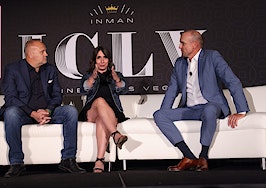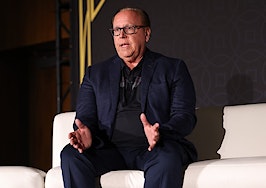Editor’s note: An earlier version of this handbook was originally published in 2020. It was updated on Friday, Oct. 29, 2021, for this year’s indie broker month.
Erica Ramus had been at a big-name franchise brokerage for a few years when an old lawyer friend wanted her to sell his house. There was just one problem.
“He knew he wanted me personally and he went to the phone book and couldn’t find me,” Ramus told Inman.

Erica Ramus
The lawyer was tenacious and kept looking for Ramus, but eventually had to call a rival franchise in the area to see if they could help locate her. The episode — which happened in late 2010 — proved to be a watershed moment for Ramus.
“That pretty much put the nail in the coffin for the franchise,” she recalled.
Ramus went on to found the Ramus Realty Group, which today is a high-performing independent brokerage based in rural Pennsylvania. Ramus described the 12-person company as “small but mighty,” and explained that in a region where reputation matters, branding around her own name had a huge impact on her bottom line.
“Putting my name on the door doubled our transactions the year I did it,” she said.
If there’s one story that has dominated the real estate industry in recent years, it’s the rise of big names and big money. Companies like Zillow and Redfin have gradually expanded their reach and are working to build end-to-end platforms. Enabled by a massive influx of venture capital, firms like Opendoor and Compass have exploded in size. And all the while, stalwarts like Realogy and Keller Williams have continued to grab headlines for their tech development or simply the massive amount of clout they control.
And yet despite this trend, smaller independent brokerages like Ramus’ — “indies” as they’re typically called — are not only hanging on but thriving. Indeed, many indie brokers who spoke with Inman say that remaining free from the big companies has offered them a unique set of benefits and that they wouldn’t want to operate any other way. That doesn’t mean indies are for everyone, but at least among those who work in them today the consensus is that they aren’t going away.
Here’s why indie brokers say that is, and what they think makes indies a viable long-term niche:
Table of Contents
- What exactly is an “indie”?
- What are the benefits of working at an indie?
- How do indies recruit and retain talent?
- How do indies handle technology?
What exactly is an “indie”?
Definitions of an indie vary. Ramus, for example, told Inman that in her mind it boils down to simply “not having to pay a franchise fee to anyone.”

Stacie Staub
Stacie Staub, founder and owner of Colorado-based West and Main Homes, had a similar take, saying that indies are companies that aren’t part of big names like Keller Williams or one of the Realogy brands.
“To me, it’s a company that doesn’t fall into or under a big box,” she said.
This is an intuitive definition, and one that many of the brokers who spoke with Inman more or less agreed with.
But it’s not entirely so simple.
Andrew Fortune, for example, runs Great Colorado Homes, has three agents, and primarily focuses on selling leads. And in Fortune’s view, an indie is not only a company that remains independent, but one that stays small as well.

Andrew Fortune
“In my mind, most are somewhere between five and 20 max agents,” he said. “To me, it kind of comes down to when you can’t get ahold of the owner.”
Many of the brokers who spoke to Inman have more agents in their shops than that, but the comment highlights that there’s a hard-to-pin-down size aspect to indies. Different brokers might draw the line at different places, but few would argue that, say, Compass or eXp Realty are at this point indies in the same sense that Ramus and her dozen agents are.
There’s also a question of resources.
Vanessa Bergmark, owner of Red Oak Realty in California’s Bay Area, told Inman that an indie is a company that’s an “independently owned and operated brand not affiliated with a back end solution provided by a franchise.”
And she also noted that “if you’re money is completely funded by a [venture capital] firm I’m not sure if you’d be considered an independent?”
It may not be possible to come to a consensus on the finer details, but for this handbook Inman spoke with brokers in offices that range in size from a handful of people to several hundred. All of them have limited geographic reach and aren’t operating at a national level. And of course none of them are affiliated with a big legacy brand.

Additional resources:
- Let’s dive into the Indie Broker world
- Thinking of going indie? 9 critical points to consider
- How to foster innovative, happy, independent agents
- Indie brokerages see opportunity in era of disruption
What are the benefits of working at an indie?
Inman asked all of the brokers who spoke out for this story — some of whom have fielded multiple buyout offers from big brands — why they ultimately choose to remain independent. And despite varying sizes, locations and goals, their answers were surprisingly consistent: Being independent gives them a more agile and liberating operation.

Vanessa Bergmark
“I don’t have to wait for headquarters to give me permission,” Bergmark, who has about 170 agents in her company, said.
In her case, that has meant the freedom to develop unique technology, partner with other local companies and evolve as the market changes. Franchises can do those things too, Bergmark observed, but as an independent owner she can move more quickly and take more chances.
“Businesses evolve, communities evolve, the industry evolves and when you are not agreeing to the bylaws of a franchise agreement you are free to evolve as you see fit,” she said. “I don’t know that that’s the same freedom you get at a franchise.”
Staub described a similar experience.
“We really do operate like a startup and really are open to our agent’s ideas and their feedback and suggestions,” she explained. “We always like to say we can say yes and then figure it out. We don’t have a board trying to tell us how to run our business.”
She added that she also likes working at an indie because “you really know where your money is going.”
“It’s less easy to track that when you’re working at a Compass or a Realogy brand,” Staub said.

Matt Beall
That kind of independence has been essential for Matt Beall, the owner and CEO of Hawai’i Life, which has just over 350 agents. Beall said the culture in Hawaii is uniquely wary of mainland influence, which means being a part of a company with a remote corporate headquarters could be a liability. Those remote companies also may not be able to telling a story about their work that resonates with local consumers.
“In the real world it matters where your decisions are made and who gets to make those decisions,” he explained. “We’re in such a different environment than most cities on the U.S. continent.”
In Courtney Poulos’ case, that freedom allowed her to develop a very specific brand. Poulos started Acme Real Estate in Los Angeles in 2011, and the idea was to create a cohesive image that resonated with first-time homebuyers. At the time, that slice of the market was dominated by low-quality flips, little or no staging and low quality photos.

Courtney Poulos
“What we were up against at that time was Keller Williams and Coldwell Banker,” Poulos told Inman. “They had some agents who did a great job and some agents who took photos with their iPhone. Our approach was to create a consistent performance.”
Because she was independent, Poulos was free to choose how to audit her data, and which slice of the market to focus on. And it worked, with the company gradually growing its client base, agent count and price point.
“We’ve moved up in price point,” she explained. “A lot of our first time homebuyers have become third time buyers, or investment buyers.”

Additional resources:
- Going hyperlocal: 5 brokerages ingraining themselves in their neighborhoods
- 3 superpowers indie brokerages have in 2020
- Franchise vs. indie brokerage: Pros and cons from a rookie agent
- 9 vital lessons one indie broker learned on her journey
- Top indie brokers share how they’ve navigated 2020’s unrest
How do indies recruit and retain talent?
Recruiting agents
Inman asked numerous brokers for this story how they recruit agents, and most of them said they don’t recruit at all.
Or rather, they don’t actively hunt down agents and make them big offers.

Michael Hickman
“We’re not blanketing the stratosphere out there and offering them money,” Michael Hickman, president and CEO of Southern California’s Seven Gables Real Estate, told Inman.
Still, Hickman’s brokerage has grown to include roughly 450 agents — the largest of the companies included in this handbook — and many of the brokers Inman contacted have seen their ranks swell at least somewhat over time as well.
So how did they do it?
Most brokers said they focused on building a very specific type of culture and then let the agents come to them. For instance, Ramus told Inman that “I don’t recruit.” But at the same time, she talked to Inman shortly after having done four interviews with potential new hires. They “were all people who knocked on my door,” she said.
Ramus said that one of the first things many agents bring up when they reach out to her is the commission split. But that’s actually one of the very last things Ramus discusses with them.
“I’m screening them for attitude or culture over the phone,” she explained of the hiring process. “And then I try to bring them in when there are a couple of people in the office so I can see how they interact. I’m screening for culture and are you going to fit with us. We run our office sort of like a super team.”
Ramus went on to say that she typically adds about three agents per year, and of the four she interviewed before talking to Inman only one is definitely going to join her company. Her point was that at a smaller brokerage good hiring decisions are more important than they are at bigger companies.
“Big offices can absorb a bad apple better than a small office can,” she explained.
Like Ramus, Staub said she also has “never had to recruit” because interested agents have consistently approached her. In her case, that happened because people at companies that provide ancillary services — so, things like title and escrow — would direct agents to her.
“It kind of grew through agent word of mouth and then through affiliate support,” she explained. “That has really been the secret to success.”
Other brokers described similar approaches, and the takeaway is that indies typically aren’t aggressively pursuing larger agent counts. They grow, but they do it slowly and only when the right candidates appear.
Retaining agents
As Poulos built her brokerage over the past decade, she began to notice that some agents would occasionally jump ship for other companies. Eventually, Poulos realized she needed to entice agents to stay and she created a “big, thick book” that became an intensive training curriculum.
“I created a training program called Agent Ascent,” she explained. “We’ve done it where it’s six weeks, two days a week, from 10 a.m. to 4p.m. It’s just these boot camp days. And then we’ve done it where it’s every other week for four months. It’s a significant amount of material.”
The training program includes everything from compliance with rules and regulations, to how to handle a contract. And while Acme still experiences some turnover, Poulos sees the training program as an important part of the value equation that keeps agents at her company.
“We’ve also had a lot of people come back to us,” she added.
Big firms obviously have training resources as well, and in some cases those resources are quite extensive. But Poulos experience highlights the way that an indie’s greater flexibility, customization and a hyperlocal focus can be an asset; her training program is based on her local experience and adapts to whatever she and her agents might need. In other words, it’s depth over breadth.
Another strategy involves making sure “no body is forgotten, no body is undervalued,” Hickman said.
With hundreds of agents and $2 billion in sales in 2020, it’s easy to imagine agents flying under the radar, or “being forgotten” in the mix at Seven Gables. To address that challenge, Hickman has a system that involves managers reaching out to agents to chat one-on-one every week.
“They make sure they contact every single agent in their office,” he said.
The end result is similar to what Poulos described: an ongoing human connection that is designed to help agents continually improve their business.
Of course, franchises and big brands can and do have similar programs. But the indie brokers who spoke with Inman touted their flexibility and increased personalization as one of the reasons agents ultimately stick with them.
Building an administrative staff
Different brokers have different strategies for building their office staff. In Staub’s case, her company has a handful managing brokers, a chief operating officer, a chief marketing officer and a chief technology officer, among other positions. But significantly, these roles were generally filled by people who started out as working agents, and who to some extent still are.
“Most of our staff is still actively selling,” Staub explained.
Given that indie brokerages often place so much importance on culture and community, Staub said hiring administrators from within can be an effective way to make sure the support staff understands the company.
Ramus has taken a somewhat different strategy for filling some of her support roles. In her case, she employs several virtual assistants who are based in other parts of the U.S., and overseas.
“There are services where you can screen people online and hire them,” she said. “There are real estate specific virtual assistants in the United States. You can hire someone for $15 to $20 an hour just to check your files.”
For Ramus, hiring support staff from around the world has meant cost savings, and it was especially useful during the coronavirus pandemic when congregating in a physical office wasn’t possible.
“It can be a good way to get talent that’s not necessarily in your back yard,” she added.

Additional Resources:
- 5 key ways indie brokers can be competitive in recruiting agents
- How to bring new hires onto your team the right way
- Why would anyone want to be your assistant? That’s up to you
- What is company culture? An indie broker-owner gives his 2 cents
- 4 critical actions indie brokers must take now
How do indies handle technology?
Technology would seem like an obvious disadvantage for indie brokers because they lack the hundreds of developers that larger companies use to build advanced platforms and apps.
But the brokers who spoke with Inman said that isn’t necessarily the case.
Bergmark, for example, said that she was disappointed with some of her technology partnerships so her company ultimately ended up building its own platform. And while she may not have the resources that a firm like Keller Williams can throw around, being smaller also meant she got to choose exactly what the technology included.
“What we’ve realized is we were very, very clear on what we needed, and sometimes the best thing you can do is build it,” she explained.
And while big brand technology works well for many agents, Bergmark added that it may also be disappointing to others because if it doesn’t quite work, “they’re not going to change it for you.”
“I think if you are someone that is specific and willing do to the work, and you care about the product, independent is the best way to go.”
Hickman’s company also built its own platform, and he explained that the key isn’t trying to make a tool that’s all things to all people.
“Most of the agents in our business just want technology to make their lives easier,” he said. “You don’t have to have 440 engineers doing that. You just have to have a sense of what the target is.”
Other brokers who spoke with Inman built a tech stack from existing providers, and said they’ve been happy with the results. For instance, Staub said that she isn’t “trying to build our own CRM.” Instead, she pieced together a suite of tools that are exactly what she wants. That includes Brokermint for back office management, RealSatisfied for customer testimonials and Mailchimp for marketing, among other things.
She added that working with these companies means always having professional tools, which is not something that always happens at bigger companies building their own tech.
“I honestly hire a lot of agents who are leaving their brokerage because all of their tech is in beta and is a hot mess,” she said.
In Ramus’ case, she has used BoomTown for her customer relationship manager (CRM) for six years. She uses Agent Image for website design, and Dot Loop for transaction management.
The list of specific tech products out there that indie brokers are using is long. But the point is that most brokers who spoke to Inman did not feel like they were at a disadvantage when it comes to technology. Instead, they said brokers just need to ask their peers to find the right products.
“Indies can get it too, you just have to know where,” Ramus concluded. “I’ll make a phone call and ask other brokers. Non-competing brokers that are outside of your area are perfectly willing to talk.”

Additional resources:







